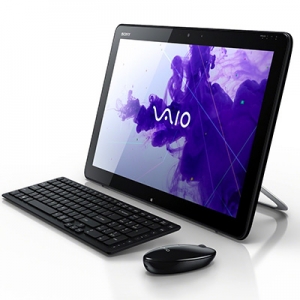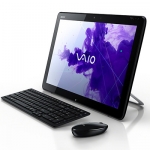The recent tile interface overhaul of Windows 8 is groundbreaking enough to spawn entirely new computer designs and devices. The Windows 8 interface makes a desktop PC feel more like a mobile tablet, therefore Sony took the next step and combined a tablet and a desktop with the Vaio Tap 20.
The Tap 20 has a healthy amount of computing power, 4GB RAM, a big 750 GB Hard Drive, but it still lacks some important features that a full desktop will offer (like no optical drive and low processing power of 1.7GHz). The Tap also has the functionality of a tablet, (20-inch touch screen, 1,600×900 pixel display, 3.75 hour battery life with video), but mobility is sacrificed with a weight of eleven pounds and a 20″x12″ design–just a smidge too large for a briefcase.
It is understandable that Sony had to make sacrifices with the Vaio Tap 20 to keep it thin enough to use as a tablet (1.5″ at its thickest point), but the lack of an optical drive or HDMI port might turn away some consumers. The Vaio does have two USB 3.0 ports that can be used attach a USB optical drive or video device, but the absence of an HDMI port makes it far less convenient to use the Vaio with a game console, cable box, or projector.
The design of the product does a great job fusing together a tablet and a desktop. Using the Vaio as a desktop only takes up 7 inches of space on your desk with a fold out stand that props the device up. A wireless keyboard and mouse is included if you prefer to take a break from swiping. Using the Vaio as a tablet may prove too large to travel everywhere, but eleven pounds is a manageable size. The display is covered in glass, but the back is soft plastic with rounded edges that are designed for an easy grip. The Vaio can sit comfortably on your lap, and the Intel Core i5 processing chip is low voltage enough keep the device from overheating.
Overall, the Sony Vaio Tap 20 is an impressive machine, other features and specifications include:
- 800p/1-megapixel webcam
- 1 SD card slot
- Near Field Communication networking with a Wireless N-135 adapter.
- Intel HD Graphics 4000 graphics processor
- A user-replaceable standard lithium ion battery.
It will be interesting to see if the Tap 20 takes off or not, because it will have a hard time winning over customers who are completely committed to either the tablet or desktop camps. The Tap 20 lacks the computing power for large media software, and it might be a little too large to conveniently whip out during a commute to work. A new device like this will appeal to a special niche of consumers; particularly, those who desire more powerful tablets with larger screens, and do not mind limiting the mobile range from room-to-room.
But the niche that wants it will have to really want it with a price tag of $1,000. This price may be too steep for PC users, but for consumers in the market for a high end tablet, dropping $1000 on a 750GB tablet with a 20″ display that uses the full Windows 8 OS may seem reasonable compared to a new 64GB iPad costing $700 with a 9.7″ display. Look for the Sony Vaio Tap 20 to release on December 10, 2012.
What do you think? Is the Sony Vaio Tap 20 the perfect marriage between tablets and desktops that you have always wanted? Or is this just another hunk of rectangular glass on the computer market? Tell us in the comments!


